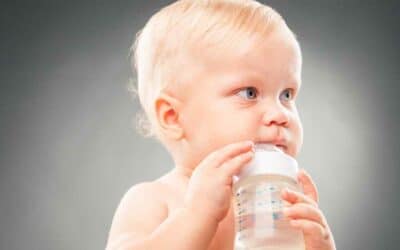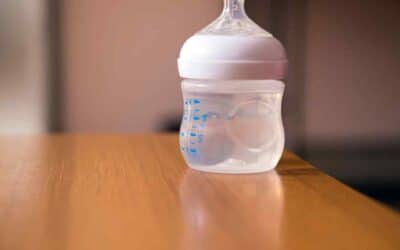Water intake plays a vital role in your baby’s healthy growth, especially for the weight gain and growth stages of their life. The effects of water consumption on baby formula intake have been well documented in medical literature, but studies have yet to be performed on whether the type of water consumed by babies could influence their health and growth.
This article is intended to provide information that may help you make better decisions about your baby’s diet and development.

What Is Distilled Water?
Distilled water is a type of purified water that has undergone a process of distillation to remove impurities, such as minerals, chemicals, and bacteria. This process makes it an excellent choice for those with a weakened immune system who may be more susceptible to possible contamination. According to the American Academy of Pediatrics, using distilled water for drinking water and preparing baby formula is a safe option, especially for infants with weakened immune systems.
There are several potential benefits of using distilled water for baby formula preparation, including:
Reduced Risk of Contaminants:
According to the Centers for Disease Control, using safe and clean drinking water for mixing formula is crucial for infant health and growth. Distilled water has been purified through the process of distillation, which removes impurities and contaminants such as bacteria, viruses, minerals, and chemicals, making it a safe option for baby formula preparation. This can help reduce the risk of lead exposure, as well as the ingestion of harmful minerals or chemicals.
Consistent Quality:
Distilled water has a consistent quality, which can help ensure that your baby is receiving the right balance of nutrients in their formula. Additionally, using safe water for mixing baby formula is crucial for infant health and growth, according to the Centers for Disease Control.
Easy to Obtain:
Packaged distilled water is widely available at grocery stores and online retailers, making it easy to obtain for formula feeding. Whether you use powdered formula, prepared formula, or ready-to-feed formula, using distilled water for making formula can save time and simplify the process. Distilled water does not require boiling or additional treatment, which can be more time-consuming and labor-intensive.
Reduced Mineral Build-Up:
Distilled water can help reduce the risk of mineral build-up, ensuring that feeding equipment remains clean and safe for your baby.
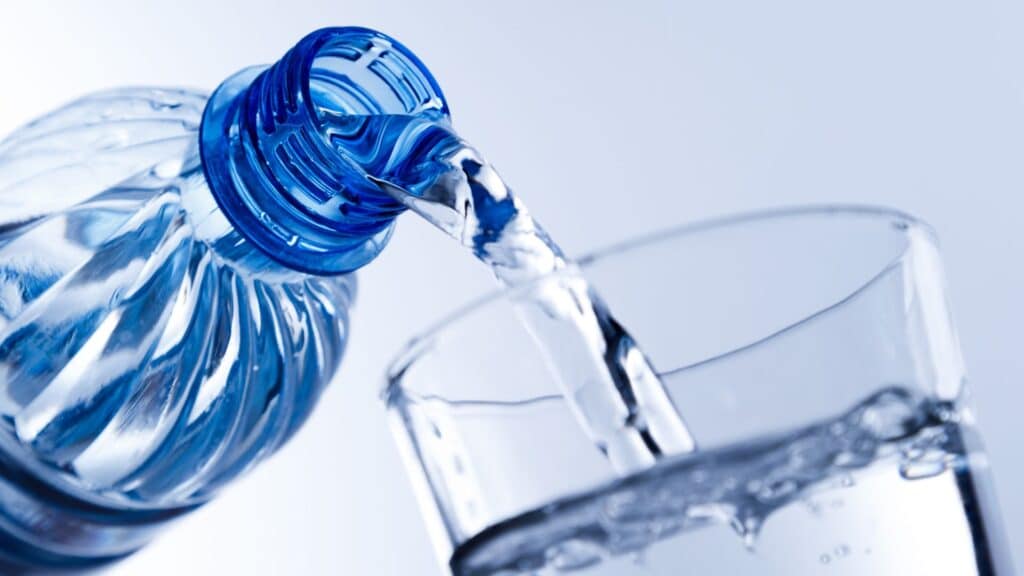
However, there are also some potential drawbacks to using distilled water for infant formula preparation:
Lack of Minerals:
Distilled water lacks minerals that are naturally present in tap water, such as fluoride. Fluoride is one such mineral that is added to tap water in some areas to help prevent tooth decay. However, it’s important to note that using too much fluoride can lead to dental fluorosis, which can cause faint white lines or spots on the teeth. Therefore, the correct amount of fluoride is important.
Some infants, particularly those born prematurely or with a blood disorder, may have special nutritional needs that require specific minerals or nutrients that may not be present in distilled water. Therefore, it’s important to consult with a healthcare provider to determine the best water source for making infant formula and to ensure that your baby is receiving adequate nutrition.
Additional Cost:
Distilled water may be more expensive than tap water, and the additional cost can add up over time.
Environmental Impact:
The process of distillation uses a significant amount of energy and may contribute to environmental pollution.
While there are potential benefits and drawbacks to using distilled water for baby formula preparation, it is important to follow the manufacturer’s instructions for preparing the formula, regardless of the type of water used.
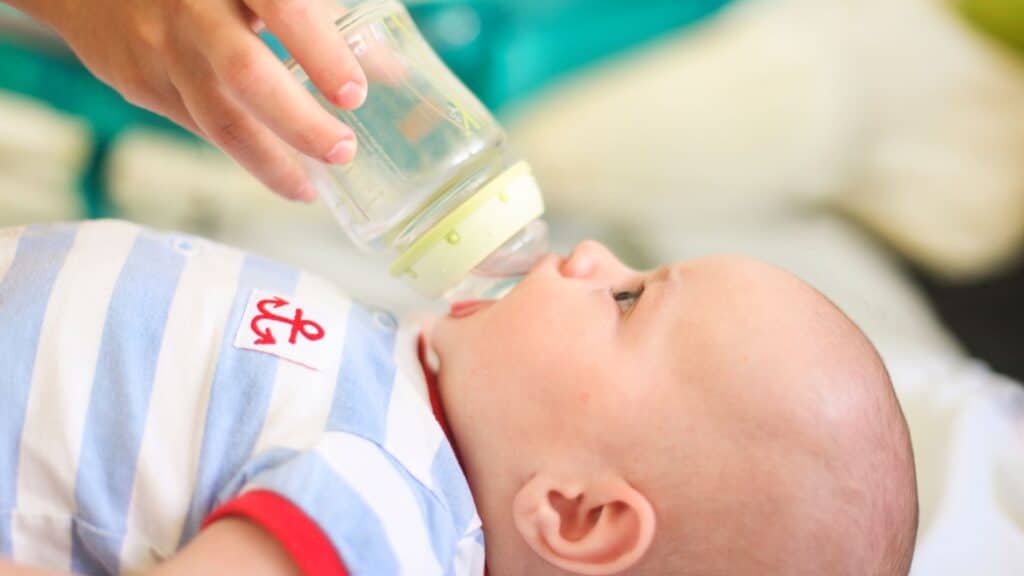
The Role of Water in Baby’s Weight Gain and Growth
Water is an essential component of a baby’s diet and plays a crucial role in their weight gain and growth. Here are some ways in which water can impact a baby’s weight gain and growth:
Hydration
Clean water is necessary to keep a baby’s body hydrated. Adequate hydration is crucial for maintaining proper bodily functions, including digestion, circulation, and temperature regulation. Proper hydration can help ensure that a baby’s body is functioning optimally and can aid in healthy weight gain and growth.
Nutrient Absorption
Water is also important for nutrient absorption. When babies consume breast milk or powder formula, they are receiving a significant amount of their required water intake. Water helps the body to digest and absorb nutrients from food, which is essential for healthy weight gain and growth.
Regulating Body Temperature
Water is necessary for regulating a baby’s body temperature, which is essential for growth and development. If a baby is not properly hydrated, their body may have difficulty regulating temperature, which can lead to discomfort and a lack of appetite.
Bowel Movements
Water is essential for bowel movements, which are critical for the elimination of waste from the body. Proper bowel movements are essential for a healthy digestive system, and they can also impact a baby’s weight gain and growth.
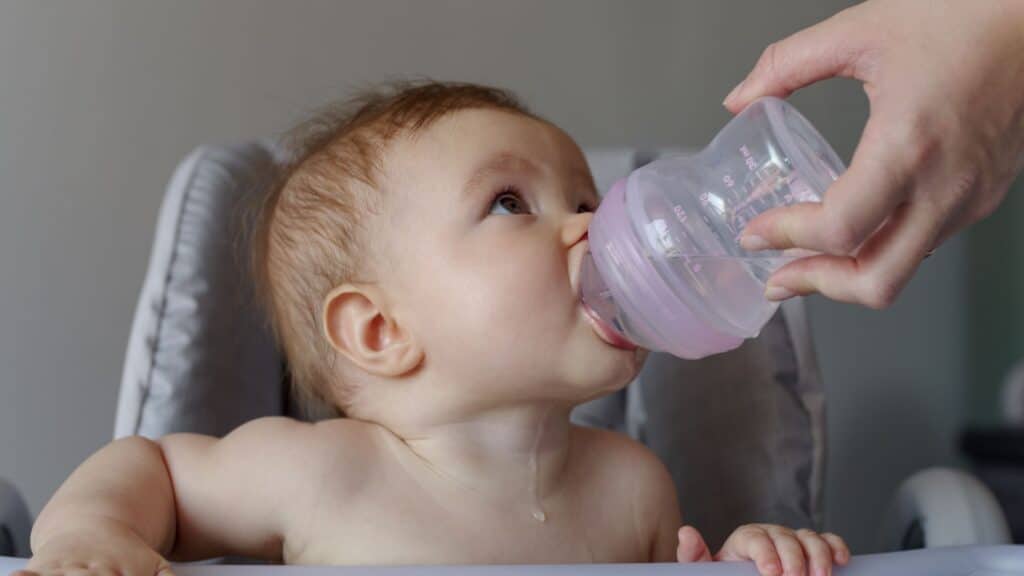
The Effects of Using Distilled Water for Formula on Baby’s Weight Gain and Growth
When it comes to preparing formula for your baby, there are a lot of things to consider. One important factor is the type of water you use to make the formula. While tap water is typically safe to use, some parents may opt for low-fluoride bottled water or distilled water. However, using distilled water for formula may have some unintended consequences on your baby’s weight gain and growth.
According to the American Academy of Pediatrics and the Centers for Disease Control, water safety is an important consideration when preparing infant formula. While distilled water may seem like a good choice for formula preparation, it lacks the essential minerals that naturally occur in fluoridated water. These minerals, such as fluoride, are important for healthy bone growth and development in infants.
Using distilled water may result in too little formula being made, as the concentrated liquid may need to be diluted with excess water. Additionally, using distilled water may require the use of fluoride supplements to ensure your baby is getting enough of this important mineral. Boiling water before using it to make baby formula helps prevent tooth decay and kills any bacteria that may be present in the water. When it comes to making baby formula, it’s important to consider all of these factors to ensure your baby is getting the nutrients they need to thrive.
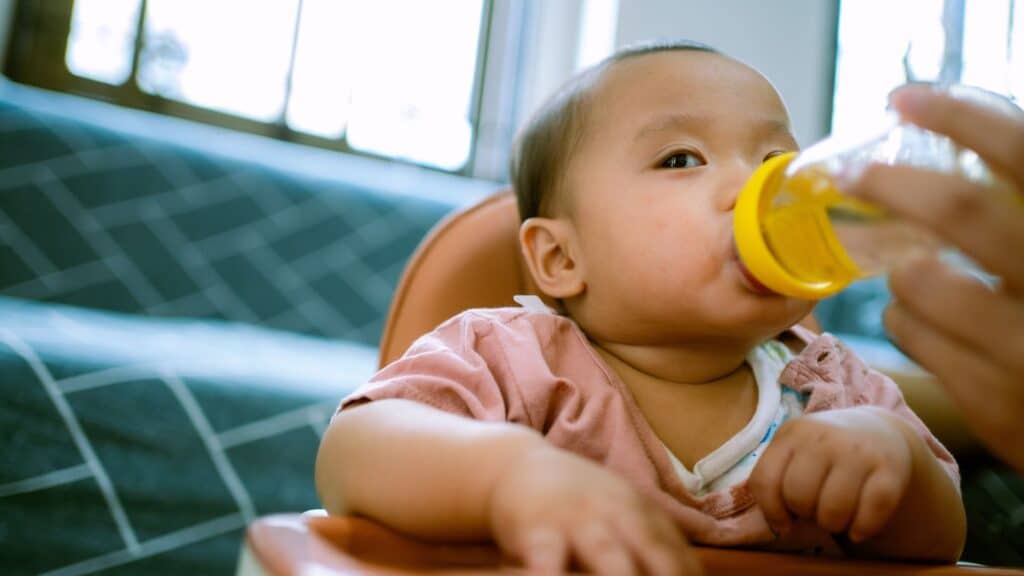
Alternatives to Using Distilled Water for Formula
If you need an alternative to distilled water for formula, you could consider using boiled tap water or bottled water. Here are some guidelines:
Boiled Tap Water
Using tap water to make baby formula can be a cost-effective and convenient option for parents. However, tap water may contain impurities and bacteria that can be harmful to your baby’s health. Boiling cold tap water can remove these impurities and kill bacteria, making it safe for your baby’s formula.
To do this, bring the water to a rolling boil for at least one minute and then let the hot water cool down to room temperature before using it to make your baby’s formula. Keep in mind that boiling tap water may not remove all contaminants such as heavy metals or chemicals, which may still be present in the water after boiling.
Additionally, if you use well water or low fluoride bottled water, it’s recommended to consult with the Environmental Protection Agency or Centers for Disease Control and Prevention for guidance on whether you need to boil the water or if it’s safe to use as is. For those using fluoridated tap water, boiling may remove some of the natural minerals found in tap water that are important for your baby’s health. Therefore, it’s important to strike a balance between ensuring the safety of your baby’s formula and maintaining the natural minerals present in the water.
Bottled Water
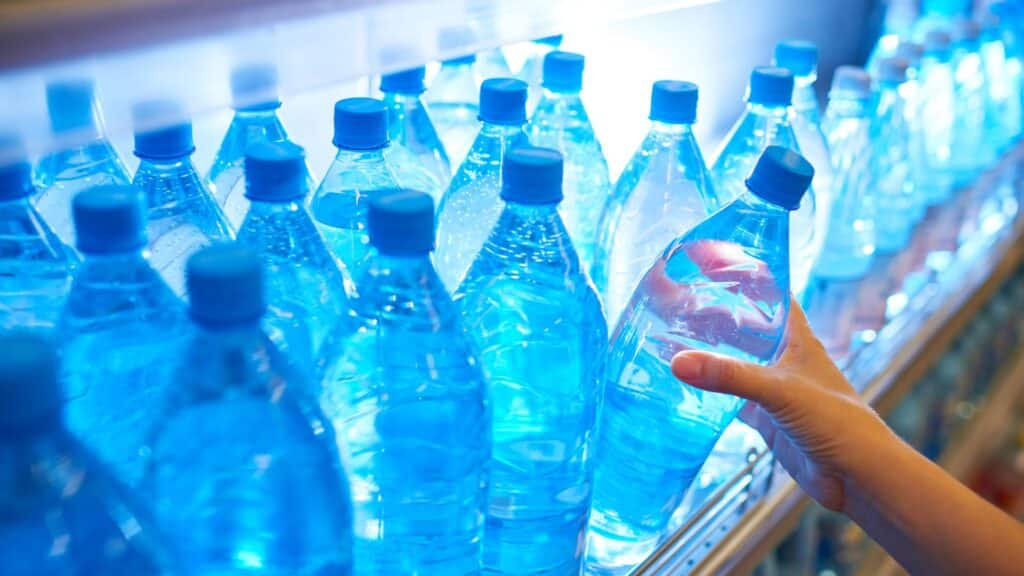
Bottled water is a popular choice for parents who want a convenient and reliable source of drinking water for their baby’s formula. However, not all bottled water is created equal. When selecting bottled water for your baby’s formula, it’s important to choose water that is labeled as safe for infant consumption and has undergone appropriate purification processes such as reverse osmosis or distillation. This ensures that the water is free from harmful contaminants and is safe for your baby’s consumption. It’s recommended to avoid mineral water or spring water, as they may contain too many minerals or other impurities that can be harmful to your baby. When using bottled water to mix infant formula powder, it’s important to pay attention to water quality and water safety.
Make sure that the formula container and bottle are clean before preparing the formula to avoid any contamination. While bottled water can be convenient, it can also be expensive and not as readily available as boiled tap water. It’s important to weigh the benefits and drawbacks when deciding on the best water source for your baby’s formula. Additionally, the Centers for Disease Control and Prevention provide guidelines on the type of water that is safe for infant consumption to ensure the health and well-being of your baby.
Filtered Water
Filtered water is an alternative option to consider when choosing a water source for preparing your baby’s formula. Water that has been filtered through a home filtration system, such as a carbon filter or reverse osmosis system, can effectively remove impurities such as chlorine or sediment, making it safe for infant consumption. However, it is important to choose a filtration system that is specifically designed to use to prepare infant formula preparation to ensure its effectiveness. While filtered water can be free from added chemicals such as chlorine or fluoride, it can also remove some of the natural minerals found in water that are important for your baby’s health.
It is recommended to consult with a healthcare professional to determine whether any additional supplementation may be necessary. Additionally, it is important to ensure that the formula container and bottle are clean before preparing the formula to avoid any contamination. The Centers for Disease Control and Prevention provide guidelines on the type of water that is safe for infant consumption to ensure the health and safety of your baby.
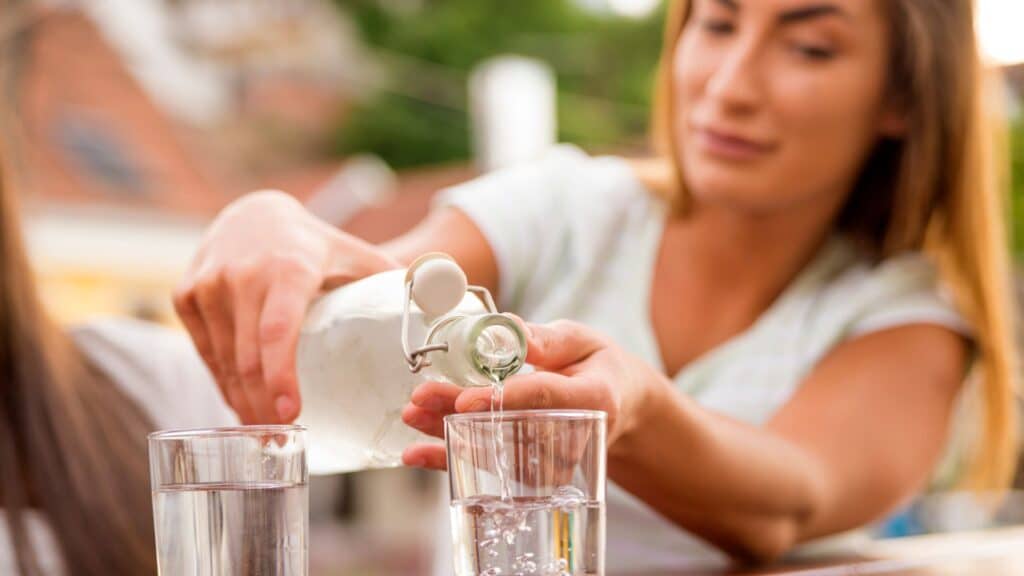
Conclusion
In conclusion, water intake is crucial for a baby’s healthy growth, and the type of water used for formula preparation can have potential benefits and drawbacks.
While distilled water may offer some benefits, such as the reduced risk of contaminants and consistent quality, it may also lack important minerals naturally present in tap water. Moreover, excessive water intake can lead to water intoxication, which can be harmful to the baby’s health.
Remember, it is crucial to make informed decisions about your baby’s diet and development, and consulting with a pediatrician can help you navigate the best practices for your baby’s health and well-being.
If you have any questions, please let us know in the comments below.

